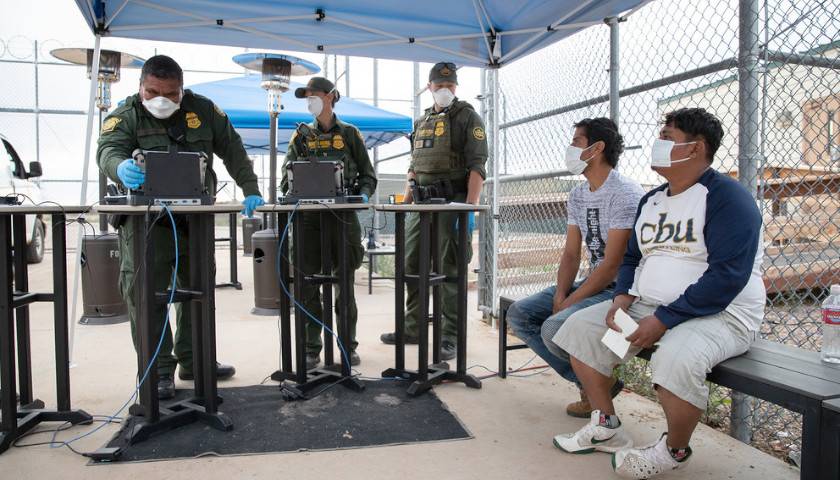by Natalia Mittelstadt
Ahead of the November election, Republicans have forced tough votes on Democrats that may hurt their chances at the polls. From election security to law enforcement to illegal immigration, House Republicans have passed bills that most House Democrats have voted against, despite Americans’ prevalent concerns about those issues.
According to the Center Square Voters’ Voice Poll, conducted with Noble Predictive Insights in March, when given a range of top concerns, 45 percent of likely voters said inflation/price increases, 44 percent said illegal immigration, and 24 percent said the economy/jobs.
The rest of the top 10 issues were abortion rights at 22 percent, crime/violence at 22 percent, government corruption at 20 percent, climate change at 19 percent, health care access at 18 percent, national debt/government spending at 16 percent, and national security at 16 percent.
According to a January poll conducted by McLaughlin & Associates and released by conservative-leaning Tea Party Patriots Action, 86 percent of voters want only U.S. citizens to be allowed to vote in elections and 87 percent of voters believe that proof of U.S. citizenship should be required to vote in elections.
Despite Americans’ concerns about only U.S. citizens voting in elections, Democrats largely voted against a bill addressing it and claimed that it was a non-issue that Republicans are using to undermine the 2024 presidential election. The Hill went as far as calling the bill “insidious.”
On Thursday, the House of Representatives passed a bill repealing a 2022 Washington D.C. law that allows non-citizens to vote in local elections. The final vote was 262-143. There were 52 Democrats who joined Republicans in supporting the bill for passage, 143 Democrats who voted against the bill, and 18 who did not vote.
The Committee on House Administration on Thursday also passed a bill that requires proof of U.S. citizenship to register to vote in federal elections.
During a committee hearing the prior week regarding the bills, Rep. Joe Morelle, D-N.Y., said that Republicans are using the “non-issue” to explain why former President Donald Trump will lose the 2024 presidential election. “This hearing is about preemptively covering Donald Trump’s lies,” Morelle said. “The hearing isn’t about law and order. It’s about laying the foundation for the next big lie. It’s about saying that illegal voting is the cause of an election defeat.”
Also during the earlier committee hearing, committee chairman Bryan Steil, R-Wis., said that 500 non-citizens are registered to vote in Washington, D.C.
In recent years, thousands of non-citizens have been found on state’s voter rolls nationwide.
Meanwhile, amid a crisis along the U.S.-Mexico border, House Republicans have brought several law enforcement and border bills to the House floor this month that most Democrats shot down.
Most House Democrats voted against DC CRIMES Act of 2024 earlier this month, which was a bill that lowered the age of a youth offender to 18 from 24 years old. While 207 Republicans voted for the bill and none voted against, only 18 Democrats voted for it, with 181 against. The bill was referred to the Senate Committee on Homeland Security and Governmental Affairs earlier this month.
For a House resolution titled, “Condemning the Biden border crisis and the tremendous burdens law enforcement officers face as a result,” 208 Republicans voted for it, with none against, while a mere 15 Democrats voted for it, with 185 against and one present.
The Detain and Deport Illegal Aliens Who Assault Cops Act was passed by the House with 211 Republicans voting for it, none against, and 54 Democrats voting for it, with 148 against. The bill requires the Department of Homeland Security (DHS) to take illegal immigrants into custody who have assaulted law enforcement officers or first responders. The bill was referred to the Senate Judiciary Committee earlier this month.
The LEOSA Reform Act passed the House with 208 Republicans voting in favor of the bill, none voting against, and 16 Democrats voting for it, with 185 against. The bill, which allows qualified active and retired law enforcement officers to carry concealed firearms across state lines, was referred to the Senate Judiciary Committee earlier this month.
The Police Our Border Act was passed by 209 House Republicans with none against, and 45 Democrats for and 157 against. The bill would require Attorney General Merrick Garland to submit a report to Congress 180 days after its enactment “on the impact the Biden border crisis is having on law enforcement officers.” The bill was referred to the Senate Judiciary Committee earlier this month.
Following Democrats’ votes against the bills during National Police Week, the House GOP criticized them in a statement, writing, “Far Left House Democrat[s] overwhelmingly voted against these bills, once again reaffirming that they are the Party of lawlessness. Most notably 148 Far Left House Democrats voted against a bill to deport illegal immigrants who assault police officers.”
In March, 214 House Republicans and 37 Democrats passed the Laken Riley Act, which would require DHS to detain illegal immigrants “who have been arrested for burglary, theft, larceny, or shoplifting,” and would authorize “states to sue the federal government for decisions or alleged failures related to immigration enforcement.” The bill died in the Senate. The bill was named after Laken Riley, a 22-year-old nursing student who was killed in February on the University of Georgia’s campus, allegedly by an illegal immigrant.
Biden had refused for weeks to address the crime, and under pressure he finally acknowledged her death in his 2024 State of the Union address, but called her “Lincoln” instead of “Laken.”
Last year, the House passed the Born-Alive Abortion Survivors Protection Act, which would require healthcare practitioners to care for a child born alive after an attempted abortion. The bill was passed with 219 Republicans voting for it, none against, and one Democrat voting for it, with 210 against and one voting present. The bill died in the Senate.
Last May, the House passed the Secure the Border Act of 2023, with 219 Republicans voting for it, and two against along with 211 Democrats. The bill, which would place limits on asylum eligibility and require employers to use an electronic verification system to determine employee eligibility when hiring, died in the Senate.
What remains to be seen is whether voters will be swayed one way or the other on the down-ticket elections by considering the Democratic Party voting records of which GOP operatives may likely hit a sore point with some of those voters.
– – –
Natalia graduated from Regent University with Bachelor of Arts degrees in Communication Studies and Government.
Background Photo “U.S. Capitol Building” by Michael Judkins.




